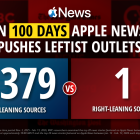 The Women’s March has a new agenda item: to delete all signs of President Donald Trump from social media.
The Women’s March has a new agenda item: to delete all signs of President Donald Trump from social media.
On May 20, the left-wing activist organization prepared 300,000 signatures as a petition to ban Trump, to be delivered at Twitter headquarters in San Francisco and New York City. The Women’s March planned to deliver the petition to Twitter “during a shareholders’ meeting.” The petition, which was launched on March 13, was originally aimed to merely “permanently suspend Trump” from Twitter. But since then, it has grown to include Facebook as well.
The group added a second petition, addressed to Twitter CEO Jack Dorsey and Facebook CEO Mark Zuckerberg, to “take down Trump’s hateful video” of Democratic Representative Ilhan Omar. The new petition asked that Trump be “suspended from Twitter and Facebook for inciting violence and engaging in hate speech.”
Omar’s comment, calling the terrorist attack on 9/11 “when some people did something,” was called out as disrespectful and outrageously dismissive. But the Women’s March, and other liberal figures like Speaker of the House Nancy Pelosi, labelled those who criticized Omar as “dangerous.”
The March is projecting its own tweets on the Twitter building in San Francisco. One image was captured on the building with the tweet, “Dear @Twitter, #ImpeachTrumpTweets, #SincerelyAmerica #andtheRestoftheWorld.”
[ads:im:1]
What kind of tweets do the Women’s March find offensive? Trump’s tweet to Iran, threatening retaliation, was determined by the experts at the Women’s March to be “threatening violence against an entire country.” The context, where an Iranian missile landed less than a mile away from the U.S. Embassy in Baghdad, was, of course, completely ignored. (As was the whole, “Crush the Great Satan” thing Iran’s been repeating for decades.)
Other Trump tweets, such as the one where he called Senator Kirsten Gillibrand out, and the video with Ilhan Omar’s comments about 9/11, were also highlighted by the March. “Tweets like these … clearly violate the company’s policy on hateful conduct,” tweeted the March. Other accusations from the March include, “sharing hateful imagery,” “making violent threats,” and “spreading fearmongering stereotypes about people of color.”
[ads:im:2]









